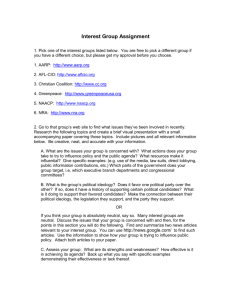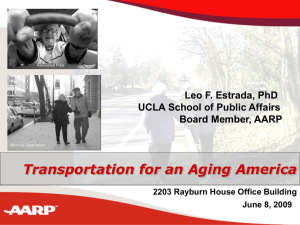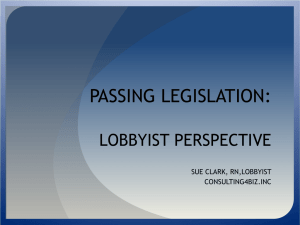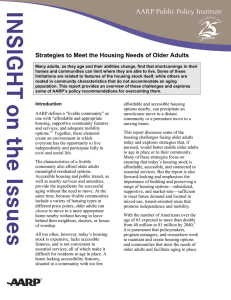DIVIDED WE FAIL DATE
advertisement
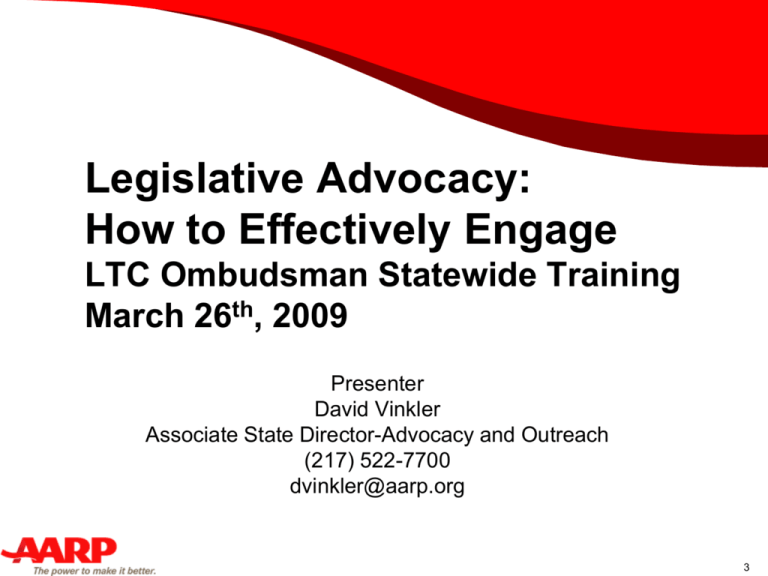
Legislative Advocacy: How to Effectively Engage LTC Ombudsman Statewide Training March 26th, 2009 Presenter David Vinkler Associate State Director-Advocacy and Outreach (217) 522-7700 dvinkler@aarp.org 3 AARP Illinois Advocacy Advocacy Manager and Staff in Springfield office State Legislative Committee – volunteers work with Advocacy Staff to: Serve as registered lobbyist Establishes state legislative goals Determines whether AARP should oppose or support specific legislation Participates in AARP activity to advocate for the desired legislative goals 3 Our Legislative Priorities Long Term Care – Providing support to older adults in need of long term care both in their community and in a facility Utilities – Protecting Illinois consumers from excessive rate hikes from electrical and other utility companies Health Care Quality and Reform – Working to improve access to affordable quality health care across Illinois 3 National Direction Divided We Fail Create a movement for change and activate the American people to propel the leadership of government, business and non-profits, as well as individuals to meet the challenges of changing demographics—to find solutions in health and retirement security that benefit all generations. 3 Pieces of Divided We Fail Stories & Pledges & & 4 Long Term Care Partners Last winter, AARP and several other groups came together with a coalition of advocates, stakeholders and service providers that serve those in need of long term care services. The groups that participated were: •AARP •SEIU •Area Agencies on Aging •Ombudsman •Home Care Service Providers and Case Managers •Adult Day Service Providers •Access Living •The Jane Addams Senior Caucus And more… 3 Coalition Goals The primary goal of the coalition was to ensure that the funding of programs and state regulations were adequate to support quality services programs. Why? Other than nursing homes, AARP and SEIU, most of these groups do not have the experience or the resources to create the presence necessary to influence the state legislative or budget process. 3 What Happened With these groups working together there were significant increases made to senior services in the fiscal year 2009 budget. While we fell short on getting many of the successes we needed in smaller programs, the Department on Aging budget was one of the very few that had an overall increase in spite of the revenue shortages. 3 Challenges 4 Key Areas for Long Term Care Advocacy •Long Term Care Structure •Financial Limitations •Awareness •Public Involvement 3 Challenges: Structural & Financial Consider how state money is spent on Long Term Care: $99,837 $90,220 $414,299 CCP Nursing Homes $1,317,464 SLF Other Senior Services Dollars in Thousands 3 Challenges: Structural & Financial 1. 2. 3. 4. Nursing Homes and Supportive Living Facilities are unified in seeking higher rates for the standard services they provide. CCP providers and other services offer a wide array of services through different mechanisms. This leaves each service with a small pool of resources and they often compete with each other for those resources. Programs like the Ombudsman Program and Elder Abuse are often overlooked in the budget process because of their relatively small size and alternate funding sources. Advocacy for issues like increasing personal needs allowance are often costly and end up pitting small programs against a large well-funded industry. 3 Challenges: Structure & Financial Example: Personal Needs Allowance 1. 2. 3. 4. The Ombudsman Program pushes for an increase in the personal needs allowance for nursing home residents every year and often several bills are introduced. The cost of increasing the personal needs allowance by only $20 per month would amount to about $15 million. Funding this change must come either from additional state dollars or out of the pocket of nursing homes. Other small programs find it difficult to assist in advocacy because they are struggling to receive funding simply to stay open. 3 Challenges: Awareness and Involvement 1. 2. 3. 4. 5. Unless a family member or an individual is faced with the need for Long Term Care Services, most people don’t know anything about them. Media is often uninterested in stories on Long Term Care except for a few cases (i.e. abuse in facilities). Services other than nursing homes can vary by region especially in the ways that people access them. Consumers of services dealing with disability, dementia and often poverty are not able to go to legislators offices or attend rallies. Caregivers must balance working and providing care. They have little time to devote to advocacy. 3 Challenges: Awareness and Involvement Time For A Quiz: • • • • Does Anyone know what CCP stands for? Where will you go when you need services but not nursing services? Can anyone name a service available through the Older Americans Act administered by your Area Agency on Aging Where does the term Ombudsman come from? 3 How do we fix it? How do you influence an elected leader? 3 How do we fix it? Campaign Contributions? • • AARP is a non-partisan organization and does not donate to campaigns Small programs do not have the resources to donate Votes and Contact? • • • This is where we have the influence Votes and contact with the legislators’ constituency is what those contributions are spent on This is where we can use everyone’s help 3 How do we fix it? Surprisingly easy methods to make an impact: • • • • • • Visit your State Representative or Senator Call or email your State Representative or Senator Write a letter to the Editor Call in to local media Communicate with each other Get Involved and involve others 3 How do we fix it? Don’t get discouraged when: • • • You receive a form letter reply Have to leave a message You don’t get the media coverage you’d like It’s all numbers: • • • One call doesn’t get much but 30 calls on the right day does. Just last year AARP & SEIU stopped millions of dollars in cuts with just 600 phone calls and the threat of a rally at the Thompson center. The more letters and press releases the media receives, the more they will respond. 3 How do you influence AARP? • If you’d like to call us with an issue and/or you’d like to get help on coordinating a Springfield visit, please call us at (217) 522-7700. Thank You 3




